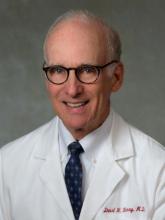David Cella, PhD, of Northwestern University in Chicago, joins Blood & Cancer as the guest host for a conversation on patient-reported outcomes and how to apply them in oncology clinical practice with Ethan Basch, MD, of the University of North Carolina, Chapel Hill.
In Clinical Correlation, Ilana Yurkiewicz, MD, of Stanford (Calif.) University, talks about invisible illness and what it’s like for a patient to be dying but appear outwardly healthy.
Show notes
By Emily Bryer, DO, resident in the department of internal medicine, University of Pennsylvania, Philadelphia
- Patients understand how they are doing better than clinicians do.
- Subjective patient outcomes (pain, fatigue, myalgias) are difficult for clinicians to classify and are often discordant with patient reports.
- In routine practice and clinical trials, the clinician reporting of adverse events/patient symptomatic side effects is inconsistent and incomplete.
- Physicians may not know about symptoms and side effects of patients undergoing treatment because:
- Patients are scared their dose will be reduced or discontinued.
- Patients don’t want to let their doctors down.
- Patients think feeling ill after chemo is “normal.”
- Questionnaires produce more accurate reports of patient symptoms than conversations with providers.
- CTCAE = Common Terminology Criteria for Adverse Events (provider version).
- PRO-CTCAE = Patient-reported outcomes version of the Common Terminology Criteria for Adverse Events.
- It is a library of individual items asking patients directly about symptomatic events.
- It is used in many clinical trials to monitor patient-reported adverse events.
- Monitoring patient-reported outcomes (PROs) systematically during visits decreases rates of emergency department visits and hospitalizations.
- Nurses and patient advocates often alert providers to PROs.
Resources:
Improving the Management of symPtoms during And following Cancer Treatment (IMPACT) consortium
For more MDedge Podcasts go to mdedge.com/podcasts
Email the show: podcasts@mdedge.com
Interact with us on Twitter: @MDedgehemonc

